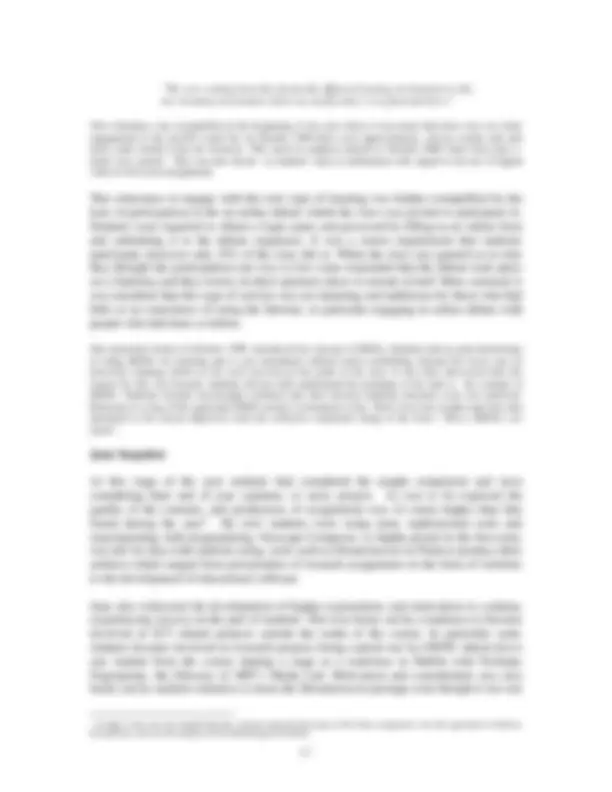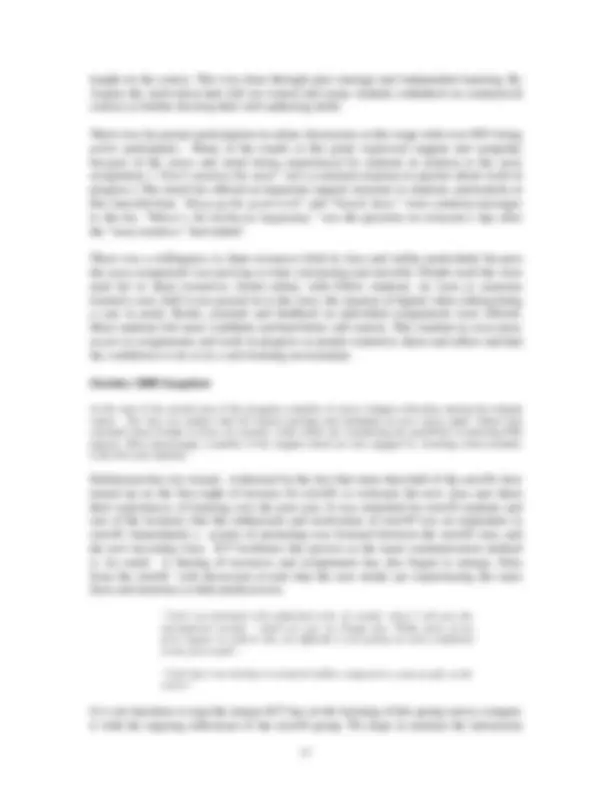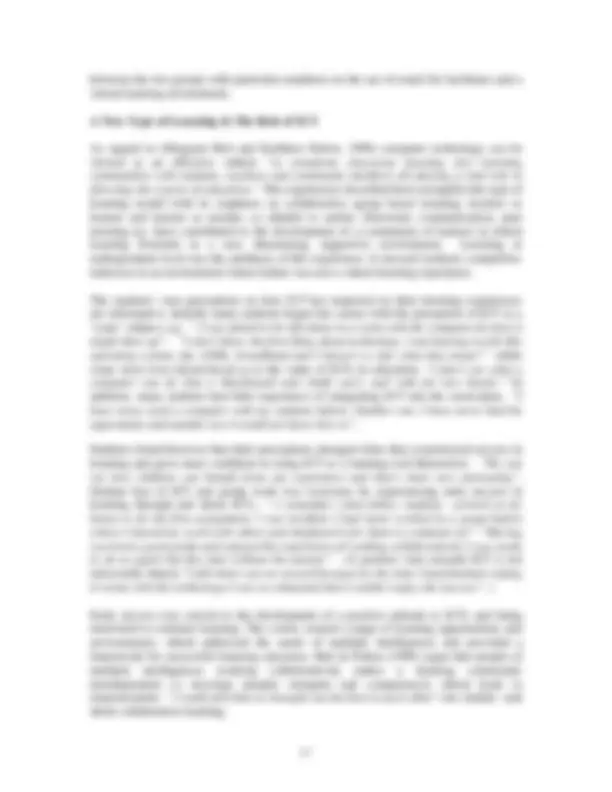





Study with the several resources on Docsity

Earn points by helping other students or get them with a premium plan


Prepare for your exams
Study with the several resources on Docsity

Earn points to download
Earn points by helping other students or get them with a premium plan
Community
Ask the community for help and clear up your study doubts
Discover the best universities in your country according to Docsity users
Free resources
Download our free guides on studying techniques, anxiety management strategies, and thesis advice from Docsity tutors
This paper discusses the experiences of a group of teachers during the first year of a Masters programme in ICT in education. The authors focus on how student-teacher attitudes towards technology and perspectives on their own learning changed over the course of the year. The use of a class email list contributed significantly to the development of a learning community, allowing students to engage in anytime, anywhere communication and peer support. Students faced initial reluctance towards new types of learning involving collaboration and communication, but by the end of the year, they were using more sophisticated tools and had higher expectations and motivation to continue learning.
Typology: Study notes
1 / 7

This page cannot be seen from the preview
Don't miss anything!




Dearbhaill Mc Kibben & Sharon McDonald, eircom Learning, Dublin, Ireland. www.eircomlearning.ie Brendan Tangney & Bryn Holmes, Centre for Research in IT in Education, Trinity College, Dublin, Ireland. www.crite.net dmckibben@eircomlearning.ie
Abstract “New ideas of any worth to be effective require a in-dept understanding and the development of skill and commitment to make them work” (Fullan, 1993)
The attitude of the teacher has been identified as a crucial factor in the successful integration of ICT in education as has the role of teacher education. This paper reflects on the learning experiences of a group of teachers – two in particular - during the first year of a Masters programme in the area of ICT in education. Supported by data gathered from the class mailing list, video taped reflection, face-to-face interviews and informal discussion this paper focuses on how student-teacher attitudes to the role of technology, and perspectives on their own learning, changed over the course of the first year.
Background
The course in question is a masters degree in the area of IT in Education run jointly by the Departments of Computer Science and Education in Trinity College Dublin. The first two authors are students on the course the second two instructors. The stated aim of the course is to enable graduates “to play a leadership role in the area of IT in education”. The degree is offered on a part-time basis over two years and is structured as a taught component followed by a substantive research dissertation leading to the degree of Master in Science.
The first cohort of twenty-eight students started in October 1999. Students were selected on the basis of academic qualifications, teaching experience and some by interview. They were characterised by a mixed ability skill set in terms of technical proficiency. Most of the students on the course were returning to formal education after many years. Assessment of student learning during the first year was via nine assignments, some done in groups, some done independently. Four assignments were given at the end of term one, four at the end of term two and one at the end of term three. The final assignment consisted of a capstone, or meta-assignment, and required a ten thousand-word dissertation and an IT artifact which was either a piece of educational multimedia or a website to present the findings of the meta research. A strong sense of community is one of the hallmarks of the class and students in the class refer to themselves as mite99 after the name of the class mailing list mite-99 (Masters in IT in Education class intake 1999). The second intake are referred to as mite.
The research reported here focuses particularly on three snapshots of the class taken in October 1999, June 2000 and October 2000. (It is from these sources that most of the student, and staff quotations, used in the rest of this paper are taken.) We attempt to identify positive and negative learning outcomes and how learning changed over time. The course aimed to provide an environment where students learned with and about technology and we explore how this changed not only the learning outcomes but also more fundamentally the learning process itself.
Summary of Findings
It was found that there was a marked contrast between the students’ learning and the attitude to learning at undergraduate level and that on the Masters course. Overall the learning experience on the Masters was a more positive one than that at undergraduate level. The reasons for this are explored fully in the body of the paper but a contributing factor was certainly the smaller class size which allowed the development of
interpersonal relationships among the entire class not possible at undergraduate level, where up to five hundred students took some courses.
As elaborated upon below the use of ICT had a significant effect. In particular the use of a simple asynchronous communication medium, i.e. a class e-mail list, contributed significantly to the development of a learning community as it allowed students to engage in anytime, anywhere communication with their peers and thus helped learning to take place in a scaffolded environment of peer support and support from lecturers.
Teaching strategies were significantly different from those at undergraduate level, where the didactic model was the norm. On the course the “lecturer as learner and learner as lecturer” model was the norm. This was evidenced through the use of video for lecturer self-analysis and reflection in an effort to learn more about teaching through and with ICT. Course lecturers acted as learners by auditing courses given by other lecturers. This allowed lecturers to experience the course as a learner and is typified by a remark made by one of the course lecturers on being interviewed as part of the reflection process at the end of the first year - “I think I’ve learned more as a learner than a teacher”. Students often acted in the role of lecturer themselves by giving classes to their peers and to the lecturers. The group dynamics and the fact that a thriving learning community existed allowed students the confidence to do this. This confidence further allowed students on the course to make even greater strides in the fields of education and business. One student on the course is now currently lecturing on this year’s first year intake, while two other students have left teaching and taken up jobs in ICT/Education companies. Still others have taken career breaks and become involved as researchers in the University’s Center for Information Technology in Education (CRITE).
The body of this paper argues that different learning and teaching strategies facilitated by the use of Information and Communication Technology characterised this positive learning experience.
October 1999 Snapshot
At the outset the class were highly committed with one student commuting from a distance of over 200 km away twice, and sometimes three times, a week to attend lectures. There was a mixed ability skill-set among students in relation to technical proficiency. This proved daunting and some students felt intimidated by the high level of experience and skills of their peers. There were students who were familiar with Java programming or had completed degrees in computer science while others were just mastering Microsoft Word! Many students were returning to learning after a long period of time and were motivated to learn because of the commitment they had made in terms of time and money. There was a willingness to use new learning tools in the quest for IT knowledge. The high attendance at lab sessions was an indicator of this willingness. Students on the course, as educationalists and parents, wanted to equate their IT skills with those of their counterparts in the business world and with those of their own students and children. Both of these aspects emerged clearly when students introduced themselves to the class at the first lecture.
At this early stage one of the main problems experienced by students was the originality of the type of learning process. Students were faced with the prospect of engaging with new technology, not just the internet but MOOs (Multi User Object Oriented), MUDs (Multi User Domains), SMART boards, digital video etc. More fundamentally students were faced with new types of learning involving collaboration, communication, presentation, publication, sharing and above all reflection on their own work and learning process. For most it was a new way of learning which was initially frightening, and off-putting, and there was some reluctance on the part of students to engage with this new methodology.
“We were exposed to completely different ways (of learning).”
taught on the course. This was done through peer tutorage and independent learning. By August the motivation had still not waned and many students embarked on commercial courses to further develop their web authoring skills.
There was far greater participation in online discussions at this stage with over 90% being active participants. Many of the emails at this point expressed support and sympathy because of the stress and strain being experienced by students in relation to the meta assignment. ( “Don’t mention the meta” was a common response to queries about work in progress.) The email list offered an important support structure to students, particularly at this stressful time. “ Keep up the good work” and “ Nearly there” were common messages to the list. “ Where’s the barbecue happening” was the question on everyone’s lips after the “ meta madness” had ended!
There was a willingness to share resources both in class and online particularly because the meta assignment was proving so time consuming and stressful. People used the class mail list to share resources, found online, with fellow students. As soon as someone learned a new skill it was passed on to the class, the mastery of digital video editing being a case in point. Books, journals and feedback on individual assignments were offered. Most students felt more confident and had better self esteem. This resulted in even more access to assignments and work in progress as people wanted to share and reflect and had the confidence to do so in a safe learning environment.
October 2000 Snapshot
At the start of the second year of the program a number of career changes took place among the original cohort. The first two authors had left formal teaching and embarked on new career paths. Others had extended career breaks to focus on research, while others are considering the possibility of pursuing PhD degrees. Most interestingly, a number of the original cohort are now engaged in lecturing course modules to the first year students.
Enthusiasm has not waned, evidenced by the fact that more than half of the mite99 class turned up on the first night of lectures for mite00 , to welcome the new class and share their experiences of learning over the past year. It was remarked by mite00 students and one of the lecturers that the enthusiasm and motivation of mite99 was an inspiration to mite00. Immediately a system of mentoring was fostered between the mite99 class and the new incoming class. ICT facilitates this process as the main communication method is via email. A sharing of resources and assignments has also begun to emerge. Data from the mite00 web discussion reveals that the new intake are experiencing the same fears and anxieties as their predecessors.
“I feel overwhelmed with unfinished tasks & wonder when I will post the uncompleted strands - which are now on Floppy disc. While many of my peers appear to achieve this, my difficulty is not getting set tasks completed on the given night”.
“I feel that I am lacking in technical ability compared to some people on the course”.
It is our intention to map the impact ICT has on the learning of this group and to compare it with the ongoing reflections of the mite99 group. We hope to monitor the interaction
between the two groups with particular emphasis on the use of email list facilitates and a virtual learning environment.
A New Type of Learning & The Role of ICT
As argued in (Margaret Riel and Kathleen Fulton, 1998) computer technology can be viewed as an effective vehicle “to transform classroom learning into learning communities with students, teachers and community members all playing a vital role in directing the course of education.” The experiences described here exemplify this type of learning model with its emphasis on collaborative group based learning, lecturer as learner and learner as teacher, as alluded to earlier. Electronic communication, peer tutoring etc. have contributed to the development of a community of learners in which learning flourishs in a non- threatening, supportive environment. Learning at undergraduate level was the antithesis of this experience. It stressed isolated, competitive endeavor in an environment where failure was not a valued learning experience.
The students’ own perceptions on how ICT has impacted on their learning experiences are informative. Initially many students began the course with the perception of ICT as a ‘scary’ subject, e.g. “ I was afraid to be left alone in a room with the computer for fear it might blow up”. “I don’t know the first thing about technology. I am hearing words like operating system, ftp, ASDL, broadband and I haven’t a clue what they mean!” while some were even unconvinced as to the value of ICTs in education. “I don’t see what a computer can do that a blackboard and chalk can’t, and with far less hassle.” In addition, many students had little experience of integrating ICT into the curriculum. “ I have never used a computer with my students before. Number one, I have never had the opportunity and number two I would not know how to”.
Students found however that their perceptions changed when they experienced success in learning and grew more confident in using ICT as a learning tool themselves. “We can see how children can benefit from our experience and that’s been very motivating”. Student fear of ICT and group work was overcome by experiencing early success in learning through and about ICTs. “ I remember when fellow students arrived at my house to do the first assignment. I was terrified. I had never worked in a group before where I shared my work with others and displayed it for them to comment on!” “Having received a good grade and enjoyed the experience of working collaboratively I was ready to do so again but this time without the anxiety” (A positive view towards ICT is not universally shared. “ I felt there was no reward because by the time I had finished coming to terms with the technology I was so exhausted that I couldn’t enjoy the success”. )
Early success was crucial to the development of a positive attitude to ICTs and being motivated to continue learning. The course created a range of learning opportunities and environments, which addressed the needs of multiple intelligences and provided a framework for successful learning outcomes. Riel & Fulton (1998) argue that people of multiple intelligences working collaboratively makes a learning community interdependent i.e develops peoples strengths and competencies which leads to empowerment. “ I really felt that we brought out the best in each other ” one student said about collaborative learning.
References